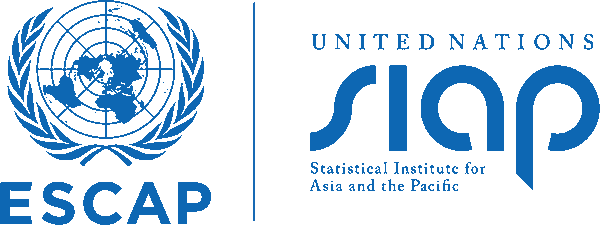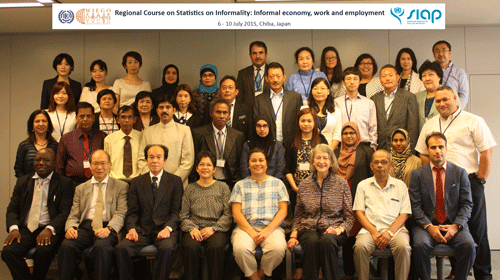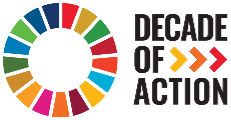
Regional Course on Statistics on Informality: Informal economy, work and employment
6 - 10 July 2015, Chiba, Japan
Objectives
• Providing technical information and illustrations of good practices on collecting and tabulating data on informal employment and employment in the informal sector, and categories of informal workers as well as related data needed for the preparation of national accounts and
• Promoting the collection of data and improvement of statistics on informal employment and employment in the informal sector as an integral part of national labour force statistics.

| Workshops Materials: | ||
|---|---|---|
Module One- Framing the discussion Objectives: (a) to provide the overall policy perspective in understanding the importance and contributions of the informal economy and statistics on informality in development; (b) to review/be familiar with the international guidelines on statistical definitions for measurement of the informal economy and their operationalization and (c) to inform on state policies on the informal economy. | ||
| Session 1.1: | What is the informal economy?—An Overview | |
| Session 1.2: | Statistical definitions: the informal economy | |
| Session 1.3: | The statistical implications of the 19th ICLS resolution concerning statistics of work, employment and labour underutilization and the 2015 ILC recommendation concerning | |
| Session 1.4: | Mapping national definitions of informal employment to international statistical standards | |
| Session 1.5: | A closer look at special groups of informal workers | |
| Session 1.6: | National policies and programmes on the informal economy and implications for statistical work | |
Module Two: Measuring Informality, Statistically Speaking Objectives: To increase capacity to apply methodologies for collecting and using data to improve measurement and production of statistics on informal employment, employment in informal sector and informal sector contribution to the economy | ||
| Session 2.1: | Overview of measurement objectives and methods for producing statistics on the informal economy | |
| Session 2.2: | Statistical units in the measurement of the informal economy | |
| Session 2.3: | Data requirements for measuring the informal economy | |
| Session 2.4: | Data sources for producing statistics on the informal economy: Household surveys, with focus on labour force surveys | |
| Session 2.5 | Data sources for producing statistics on the informal economy: Establishment-based data collection, with focus on data for GDP estimation | |
| Session 2.5.1: | Integrating the informal economy into national economy | |
| Session 2.5.2: | Establishment Surveys as a Source of Data on GDP Estimation | |
| Session 2.6: | Data sources for producing statistics on the informal economy: Mixed surveys, with focus on 1-2 surveys | |
| Country presentation | - Mongolia : Estimate of GDP Contribution of the Informal Economy - Philippines : GDP Estimation for the 2008 Informal Sector | |
| Session 2.7: | Improving statistics on the informal economy | |
Module Three: Producing and Presenting Statistics and Indicators on the Informal Economy: Increasing Value for Policy Needs Objective: To provide technical knowledge for production and effective communication of policy-relevant statistics on informality | ||
| Session 3.1: | Going from questions to derived variables on work in the informal economy | |
| Session 3.2: | Going from derived variables to indicators on work in the informal economy | |
| Session 3.3: | Presenting and using statistics and indicators on work in the informal economy: with focus on statistics for specific groups of informal workers | |
| Session 3.4: | Going from questions to derived variables on GDP contribution of the informal economy | |
Module Four: Way forward Objective: To develop doable, time bound action plans for improving statistical capacity for producing timely and reliable statistics on informality | ||
| Session 4.1: | Challenges in Improving Measurement of the Informal Economy | |
| Session 4.2: | Capacity-building for Improving Measurement of the Informal Economy | |
| Session 4.3: | Way forward: Next steps by countries— identifying actions to be taken over the next six months | |
| Reference Materials: | ||
|---|---|---|
| Measuring informality: A statistical manual on the informal sector and informal employment | ||
| The Fifteenth International Conference of Labour Statisticians | ||
| Guidelines concerning a statistical definition of informal employment | ||
| Resolution concerning statistics of work, employment and labour underutilization | ||
| Reports of the Committee on the Transition from the Informal to the Formal Economy: Instruments submitted for adoption by the Conference | ||
| A guide to Obaining Data on Tyesof Informal Workers in Offical Statistics, WIEGO | ||
Country paper & Presentations | Link | |
